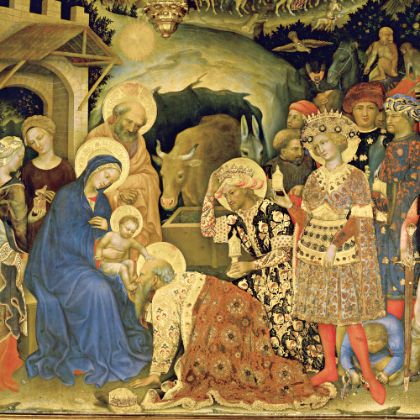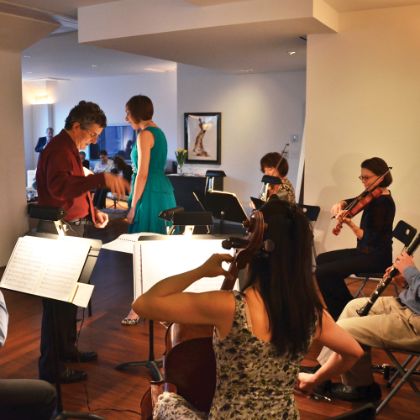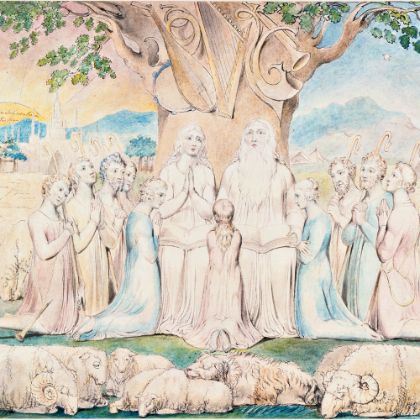After over 250 years, we still sing ‘Hallelujah’ for Handel.
By Ben Finane
While the luster of popular music fades with subsequent hearings, a masterwork only gains in brilliance. Yet a masterwork achieves its greatness not through rote repetition but because of a richness of craft and substance that permits it to be viewed from so many angles that a fresh interpretation is always within the realm of possibility. After over two hundred fifty years of continuous performance, having bent to and having survived every conceivable and inconceivable manner of orchestration, having accommodated choirs of a dozen to choirs of thousands, Handel’s Messiah thrives as ever, and remains the most popular work in all of choral literature.
Much has been made of the fact that Handel wrote Messiah in the space of twenty-four days. But Handel had been preparing to write this work all his life. Messiah is Handel’s perfect storm. It was composed as an English oratorio, a genre Handel invented out of necessity to meet the conditions of his market, one that served a sacred-music audience while maximizing his talents in operatic, instrumental and choral writing. But Messiah is unique among Handel’s oratorios in that its ethereal narrative freed him from the usual operatic temptations and distractions of plot, action and character and forced the composer into a meditative corner, where he created a masterpiece that takes on nothing less than Death, Resurrection and Redemption. Handel did so in resplendent fashion and yet — and this is more astounding — he did so modestly and accessibly.
Upon first opening the score to Messiah, I was struck not by an arresting and overwhelming genius that leapt from the page, but rather a simplicity of design so humble and unassuming that I had to check the spine to make sure I wasn’t looking at an orchestral reduction. The staves fit comfortably on the page, two or three at a time: voice parts, basso continuo and violins; often with cello and viola; often without any strings apart from continuo; occasionally with trumpet, oboe and timpani. That was it. Reasoning that there must then be some complex harmonic changes, shifts in key, distant modulations, I gave the score another pass, and found nothing. Everything was clear and revealed itself after modest examination. Meter? Standard. Tricky rhythms? Clever moves that were well placed, but nothing deceptive. What then is the secret to the genius and unshakable integrity of Messiah? Perhaps the answer lies somewhere in the dictated modesty of the composition itself, which does not reach up to God through majestic gesture but rather seeks Him earthbound through humility and subjugation of the ego. In chiseling out this message, Handel finds a kinship with twentieth-century writer Antoine de Saint-Exupéry, who asserted that perfection is achieved not when there is nothing more to add, but when there is nothing left to take away. Messiah does not employ empty flourish or ornamentation; its coloration and pristine libretto serve a greater aim: to encapsulate the message of Christian Redemption.
While it had its predecessors, English oratorio was essentially Handel’s creation. In fashioning the genre, Handel synthesized elements from Italian opera, the English masque and anthem, French classical drama, German Protestant oratorio, and Italian opera seria and oratorio volgare (all while adhering to the prohibition of public staging of biblical drama in Britain — then by decree of the Bishop of London, Edmund Gibson, though the ban presaged Gibson by quite some time). Handel became a naturalized English citizen in 1726, but his musical heritage draws on wider European traditions, which accounts not only for his broad taste, but also his broad appeal.
Charles Jennens’ unornamented libretto to Messiah comprises Scripture selections that relate the Christian belief in the birth, death and resurrection of Jesus Christ instead of dramatic events from his life. Weaving texts from the Old and the New Testaments, he constructed a Christian narrative that succeeds without characters and narrative action. Credit is due to Jennens beyond that of an “assembler” of Scripture. Rarely did he make considerable changes to the original Scripture he chose for Messiah, but those changes he did make were subtle and effective. For pithiness’ sake he frequently omitted repeated verbs as well as conjunctions and he occasionally substituted pronouns and verb tenses in order to unify or dramatize the text or improve the ease of singing and comprehension. On rare occasion Jennens would reword text to improve narrative flow.
If Messiah is unstaged, it remains a drama, one in which the momentum is internal and intellectual rather than external and visceral. The listener’s knowledge of the historical biblical narrative is assumed, permitting, in rather avant-garde fashion, a commentary and meditation on events not explicitly presented. For Jennens, Messiah represented an opportunity to reassert traditional Christian values, particularly against the rising movement of Deism, which derives the existence and nature of God from reason and personal experience and rejects supernatural events — including miracles and prophecy. While the historical role of evangelism in Christianity is tainted at best, to label Jennens’ zeal for his work as anti-Deist or anti-Semitic — as some critics have — rather than simply pro-Christian, seems grossly unwarranted. Standing in direct contradiction to charges of the work’s anti-Semitism is the rich charitable tradition that Messiah sparked and continues to uphold, to Christians and non-Christians alike.
Messiah was a success in its 1742 Dublin premiere, where a review described it as “the most finished piece of music.” But the oratorio did not fare as well in London, where it caused outcry for its use of Scripture in the theatre. Though it had been composed in London, Messiah concluded the Dublin season in 1742, with two performances benefiting three charities, which helped to allay any controversy over the oratorio’s use of scriptural texts. Messiah went underground briefly, and was performed without its proper title until 1750, when it was performed in the chapel of Foundling Hospital. The annual series there helped cement the popular conception that Messiah — and Handel’s other oratorios — could be considered sacred music appropriate for church performance.
It is difficult to locate a definitive version of Handel’s Messiah; in the words of the late music writer Michael Steinberg, “Messiah is a moving target.” We know that the work was composed by Handel in the summer of 1741, and that he adapted and changed the work every time he performed it, including the first performance, until 1753. These changes were often practical, transposing music and reallocating movements based on which singers and musicians were available for the performances in question. Many changes and revisions of the Handel–directed performances of Messiah (1742–1759) came at the behest of soloists who wanted their arias expressly suited to their voices.
Messiah has a rich recording history that stretches back to the beginning of recorded music. Today there are dozens and dozens of albums to choose from. They run the gamut from modern instruments to historically informed performance (HIP) on period instruments, from small chamber performances to brass-infused casts of, yes, thousands, from painstaking re-creations of Handel’s own myriad versions to revised scores that go well beyond Mozart’s re-orchestration into the twentieth century.
My personal favorite Messiah recording is René Jacobs conducting the 1750 version with the Freiburg Baroque Orchestra and Choir of Clare College (Harmonia Mundi). The 1750 version of the score (conducted by the composer) is preferred not only for its transparency and spare orchestration, but for its incorporation of the last revisions that Handel made for aesthetic reasons instead of practical concerns. Jacobs and his chamber-sized, period-instrument ensemble fill Messiah with dramatic urgency within a lean framework. The soloists are expressive and imbue their arias with tasteful ornamentation, with countertenor Lawrence Zazzo providing some exotic color.
Did the popularity of Messiah grow as a result of its shift from Lenten entertainment to an entrenched Yuletide tradition? Certainly, just as stagings of Charles Dickens’ A Christmas Carol, the television special A Charlie Brown Christmas, and The Pogues’ ballad “Fairytale of New York” have profited from their Christmastime associations. But, like Messiah, all these works transcend the trappings of their season and are masterpieces on their own merits, regardless of context. Is Messiah a work of Christian propaganda? Certainly, but to dismiss it as such ignores the oratorio’s reach, which extends beyond a sectarian audience (by design, not by accident) to provide universal spiritual and psychological insight into the human condition. Listeners of all faiths can be touched by the innocent joy Handel infuses into “Every valley shall be exalted,” the wonderment of “For unto us a child is born,” and the thanks giving and reconciliation of “Hallelujah.” The human urgency behind “Why do the nations so furiously rage together” is too great to be bounded solely in Christian doctrine, and the passionate recitative “Thy rebuke hath broken his heart” legitimately speaks to mortal father–son relationships in addition to the divine one that is its subject. “Since by man came death” offers a reflection on mortality as introspective as any Shakespeare tragedy, and Handel’s closing “Amen” is as comforting and world-righting as anything in the classical canon. Here’s to another two hundred fifty years.
Ben Finane is Editor in Chief of listenmusicculture.com and author of Handel’s Messiah and His English Oratorios (Continuum Books).

Photos: Louvre Museum, Lebrecht Music & Arts, The Granger Collection, NY
-

From Christemasse to Carole
The birth of Christmas in medieval England
Read More
By David Vernier -

The Next (Not-So-)Big Thing
New chamber orchestras are popping up all over America.
Read More
By Colin Eatock -

A Father's Lament
Finding solace in the sound of authentic sorrow
Read More
By Rev. Jake Bohstedt Morrill